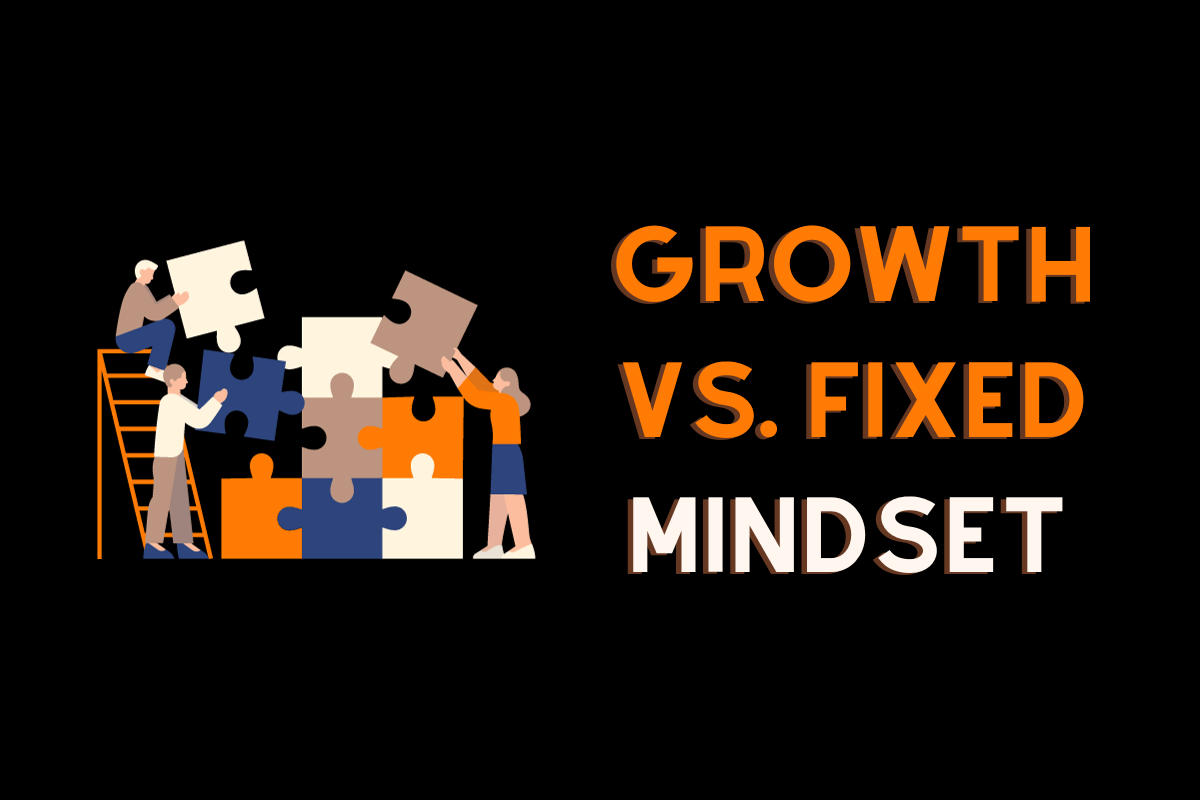Our mindset is the lens through which we view the world! And growth and fixed mindsets are like the yin and yang of our mental landscape. Understanding these mindsets can be a game-changer because when you can switch yours to one that welcomes growth it becomes like having a GPS for personal development. Embracing a growth mindset can open up a world of possibilities as at its core it’s about unlocking your potential and thriving on challenges.
Growth Mindset vs. Fixed Mindset

It’s like a garden where you water the seeds of effort, embrace challenges, and see failures as fertilizer for future success. It’s all about believing in the potential for improvement and learning.
On the flip side, a fixed mindset can act as a mental straightjacket. It limits you, puts you in a comfort zone that’s more like a prison. It’s the belief that our abilities are set in stone—either you’ve got it, or you don’t. Challenges become threats, and effort is seen as fruitless because, well, you’re either born with it or you’re not, right?
The growth mindset definition
It’s the belief that your abilities and intelligence can be developed and strengthened through dedication, hard work, and learning. In a nutshell, it’s the idea that your talents are not fixed traits but rather potential seeds waiting to sprout with effort and perseverance.
Folks with a growth mindset see challenges as opportunities to grow, effort as the path to mastery, and setbacks as stepping stones to success. It’s a dynamic approach to life that thrives on curiosity and the belief that improvement is always possible. So, in a growth mindset, the journey is just as important as the destination, and every stumble is a chance to bounce back higher.
The fixed mindset definition
A fixed mindset refers to the belief that one’s abilities, intelligence, and talents are fixed traits that cannot be significantly developed or changed. Individuals with a fixed mindset tend to avoid challenges, give up easily in the face of obstacles, see effort as fruitless, ignore useful feedback, and feel threatened by the success of others. This mindset can limit personal and intellectual growth, as it discourages the belief in the potential for improvement through learning and effort.
Awareness is the first step to change. Once you understand the importance of these mindsets, you can actively choose the one that propels you forward rather than holding you back.
Real-life scenarios of growth mindset in action

Learning from failure
Imagine a student who receives a low grade on a math test. Someone with a growth mindset would view this setback as an opportunity to learn and improve. They might analyze their mistakes, seek additional help, and approach the next test with a determination to do better.
Embracing challenges
Picture an employee who is assigned a complex project at work. Instead of feeling overwhelmed, a person with a growth mindset would see this as a chance to expand their skills and knowledge. They might proactively seek out resources, ask for guidance, and tackle the project with a positive attitude.
Receiving constructive feedback
Consider an artist who shares their work with others and receives constructive criticism. Rather than taking it personally, someone with a growth mindset would appreciate the feedback as a means of improving their craft. They might use the suggestions to refine their skills and produce even better artwork in the future.
Adapting to change
Think about an entrepreneur whose business faces unexpected challenges due to market shifts. A person with a growth mindset would see this as an opportunity to adapt and innovate. They might explore new strategies, seek input from others, and use the experience to develop a more resilient and dynamic business model.
Developing new skills
Envision an individual who decides to learn a new language. Instead of assuming that language proficiency is a fixed trait, someone with a growth mindset would approach the learning process with dedication and perseverance. They might use various resources, practice regularly, and embrace the inevitable challenges as part of the learning journey.
In each of these scenarios, individuals with a growth mindset approach challenges, setbacks, and feedback with a belief that their abilities can be developed through effort, learning, and perseverance.
How to Develop a Growth Mindset in Five Steps

- Embracing Challenges as Opportunities
- Accepting Effort as a Path to Mastery
- Learning from Criticism and Feedback
- Finding Inspiration in Others’ Success
- Cultivating a Love for Learning
Anyone can choose any of these steps to take to switch their mindset to one of growth. The absence of taking any of these paths is what keeps someone in a fixed mindset.
While a fixed mindset repels change and improvement, a growth mindset has a wealth of benefits. Adopting a growth mindset helps enhance resilience and adaptability. Embracing growth encourages continuous learning and improvement. A growth mindset fosters innovation and creativity, most importantly it should be perceived as a way of building confidence and self-esteem.
Adopting a growth mindset can have a profound and lifelong impact across various aspects of life. Individuals with a growth mindset are more likely to see learning as a lifelong journey and will therefore embrace new challenges, seek opportunities for growth, and be enthusiastic about acquiring new skills throughout their lives.
When faced with setbacks, people with a growth mindset are more likely to bounce back, learn from their experiences, and approach future challenges with a positive and determined attitude.
A growth mindset improves relationships as individuals who see the potential for growth in themselves and others are more likely to provide support, encouragement, and constructive feedback. This mindset fosters a collaborative and positive environment in personal and professional relationships.
The takeaway here is that a growth mindset contributes to overall well-being and life satisfaction. The belief that one can learn, improve, and adapt fosters a sense of control over one’s life.
This positive outlook can lead to greater happiness, fulfillment, and a more optimistic approach to life’s ups and downs. And the great news is that it is very much in your power to approach any situation with a growth mindset now that you know the difference!



